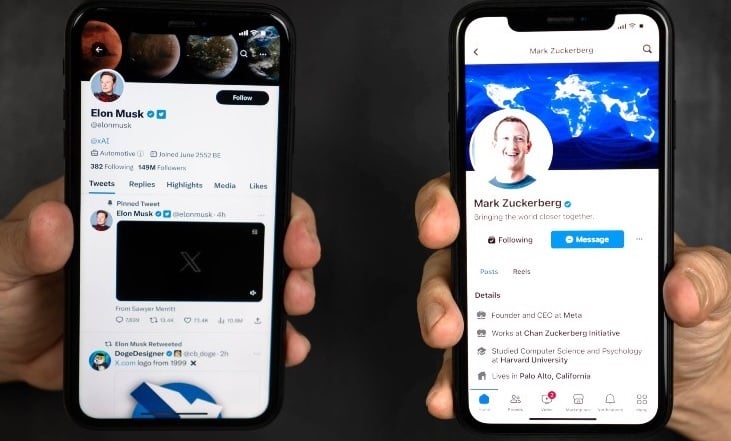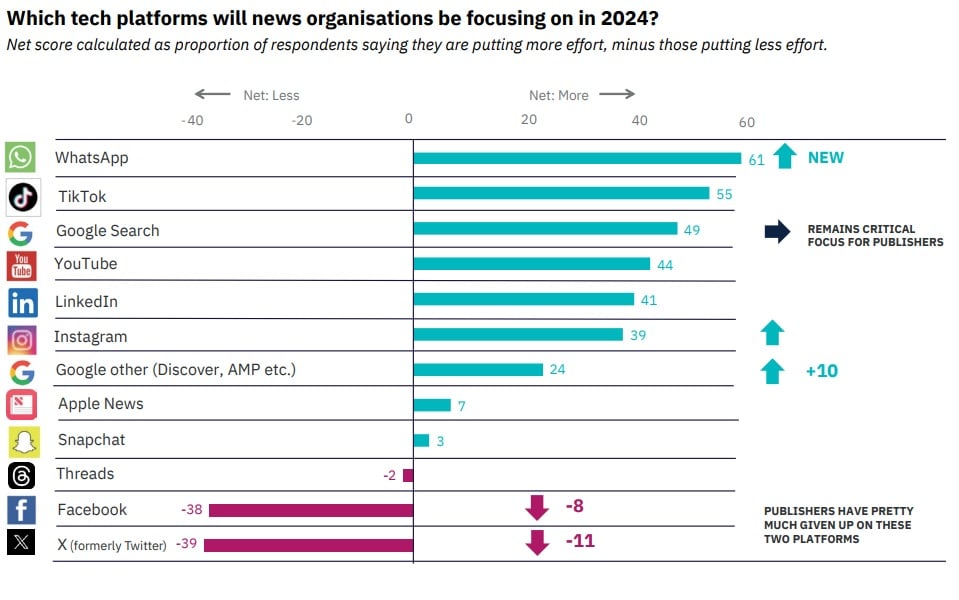Meanwhile, news traffic from X/Twitter also dropped 27% as owner Elon Musk made significant changes to the social media platform, including removing headlines from posted links and reportedly restricting access to major news outlets like Reuters and the New York Times. Additionally, news traffic from Meta-owned Instagram also dropped 10%.

X/Twitter and Facebook have almost completely stopped supporting press news. Photo: GI
77% want to invest in solutions to directly reach readers
The Reuters Institute study, called Journalism, Media and Technology Trends and Predictions 2024, surveyed more than 300 digital news publishing leaders from more than 50 countries, finding that nearly two-thirds (63%) said they were concerned about a sharp decline in news referrals on social media platforms.
In response, news organizations are looking for new ways to reach their audiences and ways to cope with economic hardship. Specifically, three-quarters (77%) of respondents pledged to invest more in direct-to-audience solutions. Additionally, one-fifth (22%) of respondents said they had to resort to cost-cutting measures due to reduced social media traffic.
Publishers are also considering increasing their use of alternative social networks. Many organizations say they will put more effort into WhatsApp and Instagram (also owned by Meta), as well as TikTok, Google, and YouTube. LinkedIn, which has benefited from X’s advertising decline, will also see more attention.

The scale shows which social media sites are prioritizing news right now. Graphic: Reuters Institute
According to the study, these social networks are better at connecting with news than Facebook or X, two platforms that were the main distribution channels for digital newspapers in the early stages of the social media era. And according to the survey, news publishers have now “quite a lot of abandonment” of Facebook and X.
Most news organizations also said they would create more video, newsletter, and podcast content by 2024, but overall the number of articles would remain the same as they simply looked to attract new audiences through other solutions and formats.
“The press needs to innovate”
Some news outlets, such as Reach, have publicly blamed Facebook for the dramatic drop in page views (down 21% year-over-year), leading to financial difficulties.
Facebook's decision to remove news priority comes after pressure on the social network to censor content and the spread of misinformation reported on the platform.
Instead of solving the problem and cooperating, Facebook decided to "cut ties" with the press, almost completely stopping support for news, despite the fact that many users still have the habit and need to read news on the world's number one social network.
It's evidence of the dangers of tech platforms holding a monopoly or domination in cyberspace, although Meta, Facebook's parent company, still has two platforms that are slightly more open to press coverage: WhatsApp and Instagram.
Many experts believe that news organizations should also blame themselves for relying too much on social media platforms like Facebook and Twitter to distribute news. Therefore, the press is said to need to create better competition with technology platforms, by improving the quality and diversifying the forms of reporting, in which the trend of news shifting to podcasts and short-form videos is emerging.
“I don’t subscribe to the back-and-forth approach of, ‘Well, you came and disrupted our business model and therefore you need to help us,’” said Ramin Beheshti, CEO of the first social news outlet The News Movement.
“I think the news industry needs to do more to innovate and find ways to connect with readers and generate revenue – which they are already doing. And I think the responsibility lies with both sides.”
Hoang Hai (according to Reuters Institute, Media Leader)
Source




![[Photo] General Secretary To Lam arrives in Minsk, begins state visit to Belarus](https://vphoto.vietnam.vn/thumb/1200x675/vietnam/resource/IMAGE/2025/5/11/76602f587468437f8b5b7104495f444d)
![[Photo] General Secretary To Lam meets and expresses gratitude to Vietnam's Belarusian friends](https://vphoto.vietnam.vn/thumb/1200x675/vietnam/resource/IMAGE/2025/5/11/c515ee2054c54a87aa8a7cb520f2fa6e)




























![[Photo] General Secretary To Lam concludes visit to Russia, departs for Belarus](https://vphoto.vietnam.vn/thumb/1200x675/vietnam/resource/IMAGE/2025/5/11/0acf1081a95e4b1d9886c67fdafd95ed)
































































Comment (0)